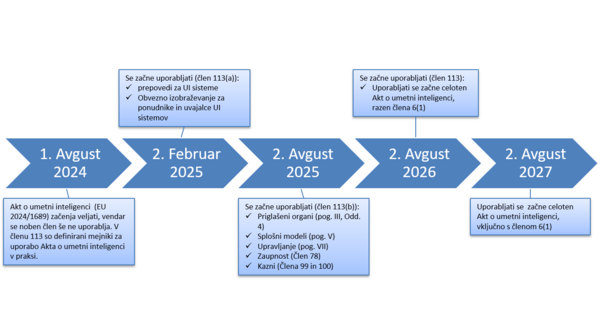The Agency for Communication Networks and Services of the Republic of Slovenia has been granted a major part of the competence over the implementation of the AI Act(Regulation of the European Parliament and of the Council of the European Union laying down harmonised rules on artificial intelligence, 2024/1689) by the Act on the implementation of the Regulation (EU) on the establishment of harmonised rules on artificial intelligence(ZIUDHPUI). The AI Act was published in the Official Journal of the EU on 12 July 2024 and entered into force on 1 August 2024. It is the first comprehensive legal framework governing the entire lifecycle of AI, from development and testing to deployment and everyday use.
The Agency is designated by law as the single point of contactfor the Republic of Slovenia. This means that it is the link for communication with the European institutions and all other national authorities for the implementation of the AI Act in the Member States.
At the same time, the Agency establishesas an entry point for communication with SMEs, including start-ups, innovators, other innovators and local authorities for advice and answers to questions on the implementation of the AI Act. The Agency is assigned the task of raising awareness and answering questions from the general public on the rights and obligations brought by the AI Act.
One of the most important competences conferred by the Act is the establishment of regulatory sandboxesfor AI. These are of paramount importance for the ethical and safe use of AI, as they will allow innovative solutions to be found in a controlled testing environment from the development stage. This is crucial for companies and other organisations to ensure that the AI systems developed are compliant with the regulatory framework. The Regulatory Sandbox will therefore allow new AI systems to be tested in a controlled way to ensure that they are developed in a way that is compliant, ethical and safe to use. The deadline for setting up at least one regulatory sandbox is 2 August 2026.
The Agency also assumes the role ofimplementing and monitoring authorityof the AI Act, namely the compliance oversight of high-risk artificial intelligence (AI) systems:
- AI systems listed in Annex I, Section A, insofar as the AI system is intended for use as a safety component of a product or the AI system itself is a product covered by EU harmonisation legislation listed in Annex I, consulting other regulatory inspection bodies as appropriate.machinery, toy safety, recreational and personal watercraft, lifts, equipment and protective systems intended for use in potentially explosive atmospheres, market accessibility of radio equipment, market accessibility of pressure equipment, cable installations, personal protective equipment, appliances burning gaseous fuels, in vitro diagnostic medical devices.
- AI systems as listed in Annex III, in the areas of critical infrastructure, employment, workforce management and access to self-employment, AI systems of public authorities for assessing the eligibility of natural persons to essential benefits and public assistance services, including health services, and for assessing, prioritising and triaging emergency calls from natural persons for referral to emergency services, including police, fire and ambulance services, as well as AI systems for emergency medical triage of patients.
The Agency will also maintain an inventory of high-risk critical infrastructure AI systems. It will consult other inspection bodies as appropriate.
In addition, the Agency is also responsible for monitoring the transparency obligations of providers and deployers of certain AI systems.
The Agency will be able to take action under the Act against a provider, product manufacturer, deployer, authorised representative, importer or distributor who places on the market, puts into service or uses an AI system that is found to be in breach of the AI Act during the surveillance process. It will also deal with complaints from Slovenian users against providers from other countries and forward them to the coordinators of the country in which the provider is registered. At the same time, it will coordinate activities at national level with other supervisory authorities in the framework of the Supervisory Authorities' Council to ensure coordinated supervision and will cooperate with coordinators from other EU Member States and with the EC. To fulfil this role, the Agency participates in the European Committee on Artificial Intelligence, which brings together Member State coordinators within the EC to support the implementation of the tasks set out in the AI Act.
